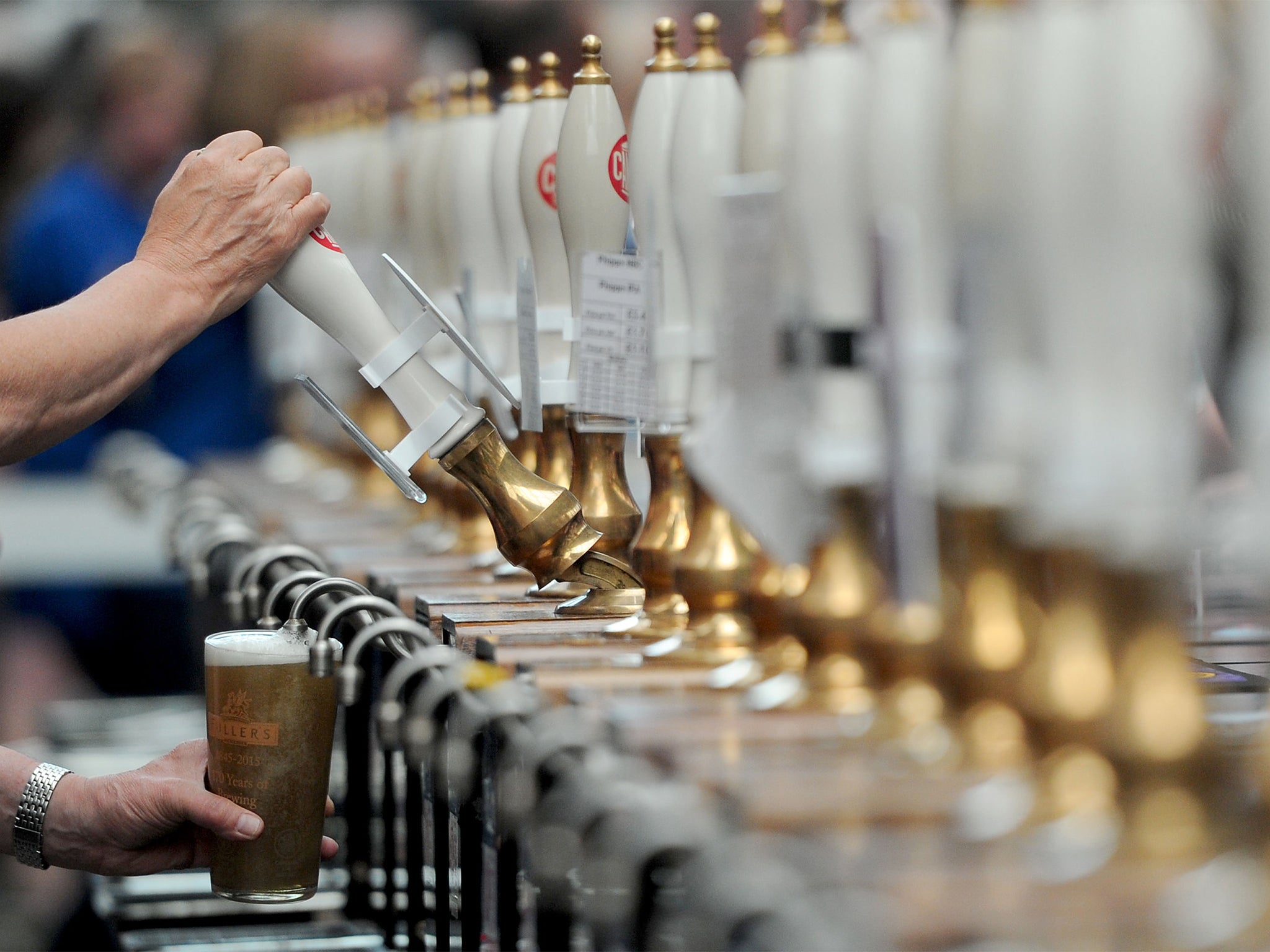Camra: UK's biggest organiser of beer festivals refuses to stock ales from breweries that don’t provide full list of ingredients
Exclusive: Camra wants to list ingredients to help allergic drinkers

Your support helps us to tell the story
From reproductive rights to climate change to Big Tech, The Independent is on the ground when the story is developing. Whether it's investigating the financials of Elon Musk's pro-Trump PAC or producing our latest documentary, 'The A Word', which shines a light on the American women fighting for reproductive rights, we know how important it is to parse out the facts from the messaging.
At such a critical moment in US history, we need reporters on the ground. Your donation allows us to keep sending journalists to speak to both sides of the story.
The Independent is trusted by Americans across the entire political spectrum. And unlike many other quality news outlets, we choose not to lock Americans out of our reporting and analysis with paywalls. We believe quality journalism should be available to everyone, paid for by those who can afford it.
Your support makes all the difference.Britain’s biggest organiser of beer festivals is refusing to stock ales from breweries that don’t provide a complete list of ingredients, in a new move to help drinkers with food allergies or intolerances.
Most beers contain gluten – which the 600,000 Britons who suffer coeliac disease cannot digest properly – as a by-product of the use of malted barley during brewing. About 40 per cent of British ales contain wheat, an ingredient which helps to give a head of foam on the beer. At least one in five Britons have some form of food allergy or intolerance, according to government estimates.
The Campaign for Real Ale (Camra) will now purchase beer only from breweries that supply full information on the ingredients they use. “Every Camra festival now has full allergen information available to customers for every single real ale on sale, which ensures that somebody with an intolerance to something like gluten or wheat can be sure the beer they are choosing is suitable for them to drink,” said Tim Page, the organisation’s chief executive.
“We want to ensure festival-goers are 100 per cent confident in the information they are given, and the only way to do that is to ensure we have the correct information at every step of the supply chain, from the brewers, to festival organisers, right through to the staff working behind our bars.
“I myself have a wheat intolerance and find it extremely difficult to get accurate information on whether a beer contains wheat or not, as it is often used in small amounts.”
The decision by Camra, which organises about 200 real ale festivals across Britain annually, comes in the wake of new EU rules on food and drink labelling introduced at the end of last year. They list 14 allergens people should be warned of if they are present in products.
The list includes cereals containing gluten, prawns and other crustaceans, mussels and other molluscs, eggs, fish, peanuts, nuts, soybeans, milk, celery, mustard, sesame, lupin and sulphur dioxide.
Under the new regulations, bottled or canned beers must ensure that if allergens are present, they are listed among the ingredients. Where beer is served in a glass or from a pump, the information can be given in writing or verbally, according to the Food Standards Agency.
But campaigners warn that many breweries are yet to list what their beers contain when it comes to allergens. One of Camra’s biggest festivals, which took place in Nottingham last month, asked more than 350 breweries to list the ingredients in their beers. But 123 failed to do so.

Health charities have welcomed the move. Pat Schooling, executive director of Action Against Allergy, said: “We thoroughly approve of this decision by Camra. The need to know what is in a drink can be as important to some people as knowing what is in a food.”
Lindsey McManus, deputy chief executive of Allergy UK, said: “Any of the 14 allergens that now have to be listed can be found in the most innocuous of foods, including beer. It’s encouraging to see food outlets such as Camra beer festivals embracing the new regulations and understanding the importance of keeping those with food allergy safe.”
Sarah Sleet, chief executive of the Coeliac UK charity, said: “As the increasing availability of gluten-free beers means that beer festivals are no longer off the menu for those with coeliac disease, a whole new consumer group could help boost interest in beer drinking.”
A growing number of brewers, keen to capitalise on the increasing popularity of the “free from” market, are now producing gluten-free ales – either by using gluten-free grains, such as sorghum, or by removing the gluten after brewing.
Britain’s first brewery to produce gluten-free beers, Green’s Beers, was established in 2003. There are now at least 10 UK breweries that specialise in gluten-free ales.
In April, David Kroll, marketing vice president of MillerCoors, said that gluten-free beers could “bring lost drinkers back to beer”. As well appealing to those who have coeliac disease – whose intolerance of wheat can result in severe stomach cramps and other symptoms – many are attracted by the perceived health benefits, according to the brewer.
Join our commenting forum
Join thought-provoking conversations, follow other Independent readers and see their replies
Comments